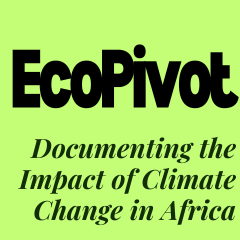Often, 25-year-old Alex could be seen at Obafemi Awolowo University in Southwestern Nigeria shovelling waste from the dump house adjacent to the school’s Health Centre. The waste would then be loaded into a big gold-white painted truck parked nearby.
Sometimes, his job appeared easier because all the waste would be in the dump house. But months ago, the situation was worse. Scraps of paper, nylon, and plastics littered the area around a rusting, thatched metallic waste bin. The decaying waste emitted a pungent, choking smell, and flies perched over it.
To understand this mess, consider this: an average person on the OAU campus, estimated to contain about 30,000 persons, generates about 0.042 kg of waste daily. Yet, this figure pales in comparison to Nigeria’s national average of 0.51kg per person, highlighting a more significant waste management crisis.
Nationwide, Nigeria produces about 32 million tonnes of waste annually, ranking among the 30 countries with the worst waste management. If unaddressed, this figure could reach 107 million tonnes by 2050.
Despite environmental protection laws, such as the 1999 Constitution (Section 20) and the Federal Environmental Protection Agency Act, waste management in Nigeria remains hindered by weak enforcement. NESREA, responsible for enforcing environmental laws, struggles to curb open refuse dumping. Poor waste management leads to blocked drains, flooding, pollution, and severe health risks, contributing to a 68.6% mortality rate from unsafe water and sanitation.
Transforming Waste Management on OAU Campus

Amidst these challenges, innovative solutions are emerging on campus. At the dumpsite where Alex worked, two others were busy alongside him. These waste workers belonged to the Guesstimate Environmental Protection Agency, a company revolutionising waste management practices.
Speaking with EcoPivot, Abayomi Idris, lead supervisor of Guesstimate on campus, shared insight into their work:
“When we came to OAU, the campus was quite dirty and didn’t reflect the glory of the university. Initially, we spent seven days a week evacuating dump sites. We noticed that the existing waste disposal methods, like metal waste bins, were inadequate as they rusted quickly and allowed waste to scatter in the wind. We then developed structured waste houses to contain waste and prevent it from spreading. These houses are strategically placed across OAU’s academic areas, with teams dedicated to waste evacuation,” he explained
Guesstimate’s approach includes segregating waste into perishable and recyclable materials, with recyclables sent for processing. “We’re bringing recycling machines from Lagos to process waste here in Ife, making recycling more efficient,” Idris revealed.
The lead supervisor of Guesstimate also noted that progress might be slowed due to people not knowing about recycling options. “People aren’t well-informed about the opportunities in recycling,” he pointed out. “While low-income earners see its potential, educated individuals often dismiss it as ‘dirty work.’ If students understood recycling’s value, they’d be more conscious about waste disposal. Sourcing waste materials for recycling can also be difficult,” Idris admitted.
Other Sustainable Initiatives on Campus
Guesstimate is not the only waste management initiative on campus. While its blue waste houses are now common, another familiar scene involves students jogging with disposable gloves and waste bags and picking up litter.
Plogging Nigeria Club, launched at OAU in June 2018 with the motto ‘Keep Fit to Keep Clean,’ has grown significantly. By 2021, it had expanded to 21 campuses, involving 1,500 Ploggas, 190 Plogging Episodes, 5,000 waste bags collected, 350km covered, and 380 hours spent plogging.
Àràyíí is another unique initiative that uses plastic bottle bins to collect waste. It transforms waste nylon found in these bins into functional accessories. This process diverts plastic waste from landfills. As a result, it benefits local communities.

Speaking with EcoPivot, Ayomide Amusan, founder of Àràyíí, explained that the plastic bottle bin project was birthed from the desire to solve plastic waste problem on campus. “First, we wanted to directly address the visible plastic pollution problem on campus,” she said. But beyond that, there was also the need to source waste nylons for Àràyíí projects.
“We realized that by collecting and reusing plastic bottles, we could potentially create a closed-loop system, reducing waste and providing a source of material for future projects,” she added.


